





Sharing Toys with Friends: Social Story for Kids
₹80
₹160
50% off
0 (0 ratings)
Grade Levels
Pre-K - Grade 1 (Ages 3-7)
Content Overview
Format: 1 PDF, 6 pages Features: Real-life images, 12 first-person statements, child-friendly language.
Categories
Pages from the Resource
Help kids learn the importance of sharing with this relatable social story. “Sharing Toys with Friends” uses real-life images and simple, engaging language to guide children through understanding why sharing is important and how to do it. This story builds empathy and social skills while making it easy for children to relate.

Page 1

Page 2
What Users Say
0
0 ratings
5
0+
4
0+
3
0+
2
0+
1
0+
5 Stars
Product is Good to use.
10 months ago
Varsha Parent
Similar Products
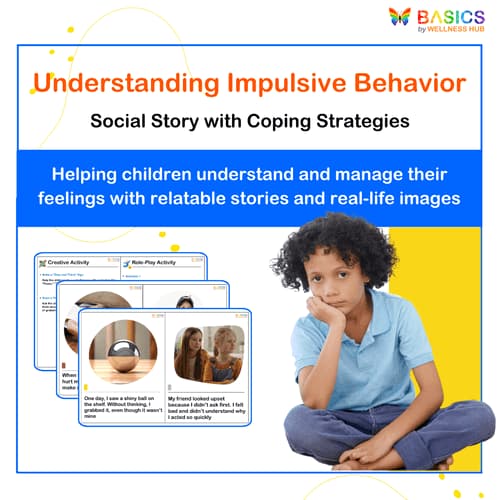
Understanding Impulsive Behavior: Social Story with Coping Strategies
₹ 80.00
₹ 160.00
50% off
4.9 (42 ratings)
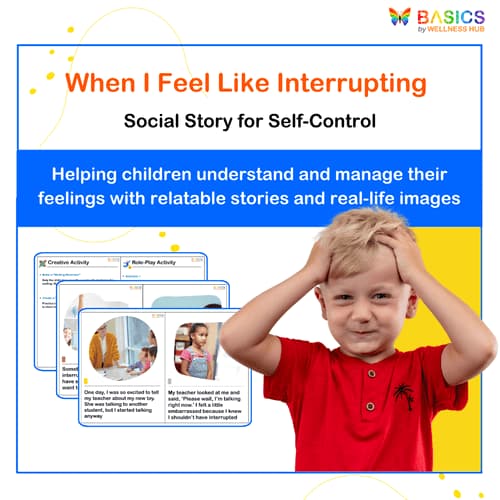
When I Feel Like Interrupting – Social Story for Self-Control
₹ 80.00
₹ 160.00
50% off
4.8 (60 ratings)
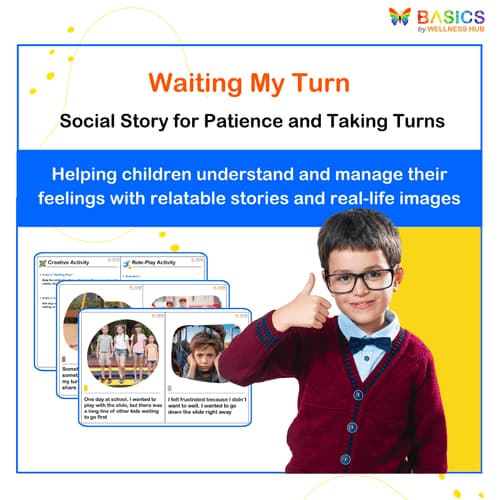
Waiting My Turn – Social Story for Patience and Taking Turns
₹ 80.00
₹ 160.00
50% off
4.7 (56 ratings)
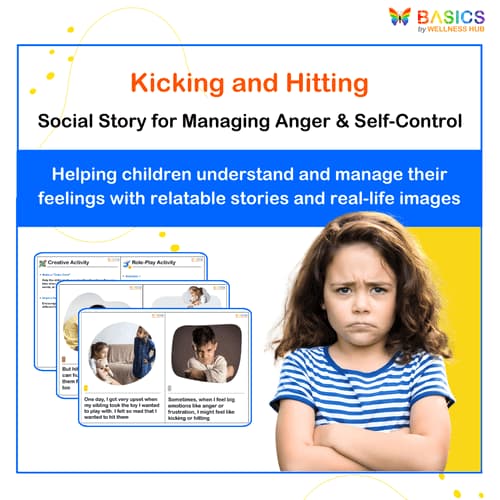
Kicking and Hitting – Social Story for Managing Anger & Self-Control
₹ 80.00
₹ 160.00
50% off
4.6 (52 ratings)
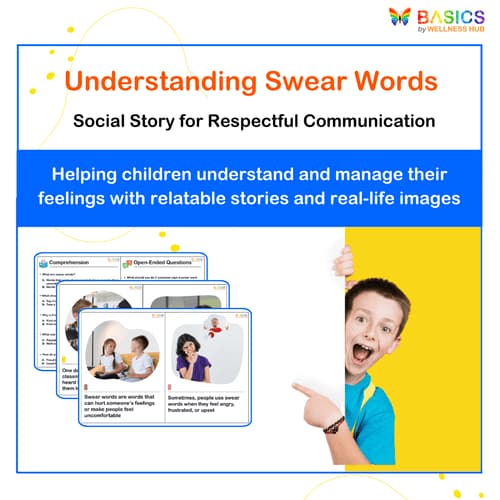
Understanding Swear Words – Social Story for Respectful Communication
₹ 80.00
₹ 160.00
50% off
4.9 (48 ratings)
About the Product
Purpose of Flashcards: The "Sharing Toys with Friends" social story is designed to help children learn the importance of sharing and the value of friendship. Through realistic and relatable images, paired with engaging first-person language, children are guided through a relatable scenario where they experience the challenges and rewards of sharing. This resource supports young learners in developing social-emotional skills, helping them navigate social situations positively and confidently. It’s particularly beneficial for children who struggle with understanding the nuances of social interactions, offering them a clear and simple narrative they can apply in their everyday lives.
Product Details
Format: 1 PDF with 6 pages
Content: 12 high-quality images (2 per page) paired with simple, first-person statements
Learning Objectives: Understanding the value of sharing, promoting positive social behavior, building empathy and communication skills
Visuals: Realistic photos that closely match the storyline, ensuring that children can relate to the scenario even if different children are pictured
Audience: Suitable for children aged 3-7, including those with special educational needs
Educational Benefits
Encourages Empathy and Social Interaction: The story helps children recognize how sharing can lead to positive social experiences and friendships.
Promotes Positive Behavior: Through simple, relatable scenarios, children learn the positive outcomes of sharing and cooperation.
Supports Social-Emotional Development: Helps children better understand emotions and how to manage them in social settings.
Visual Learning: The use of realistic images aids in comprehension and helps reinforce the learning objectives.
Inclusive and Adaptive Learning: Ideal for children in mainstream education as well as those with special needs or developmental delays.
Instructions for Use
Read Aloud with Engagement: Begin by reading the story aloud with your child or student. Pause to ask questions or discuss what is happening in each scenario.
Reinforce Concepts: After each segment, encourage the child to think of a time they shared or could share in a similar way. This builds a bridge between the story and their real-life experiences.
Role-Playing Activities: Use the scenarios to create role-playing activities where the child can practice sharing toys with you, siblings, or peers.
Use Visual Prompts: Encourage the child to observe the images closely and describe what’s happening. This visual cueing helps reinforce the message.
Revisit Regularly: This story can be revisited when needed to reinforce positive behavior, particularly before playdates or group activities where sharing may be required.
Activities Using the Resource
Guided Reading and Discussion: Read the story aloud with your child or group of children, pausing after each page to discuss the key messages. Ask questions like, “How do you think the characters feel when they share?” or “What happens when they choose not to share?” These discussions help deepen understanding and encourage empathy.
Role-Playing: After reading the story, set up a role-playing activity where children practice sharing toys. Use different scenarios where one child has to share a toy with another. Encourage them to use phrases like “Would you like to play with this?” or “Can we take turns?” This helps reinforce the lessons learned from the story.
Story Reflection Journals: Have children draw or write about a time when they shared something with a friend or sibling. They can illustrate how sharing made them feel and what they learned from the experience. This activity helps children internalize the lesson and relate it to their real-life experiences.
Sharing Games: Organize group games that naturally involve sharing and taking turns, such as building with blocks or playing board games. After the activity, discuss how sharing and taking turns made the game more fun and inclusive for everyone.
Visual Story Sequence: Print out the story’s images and have children arrange them in the correct order. They can retell the story in their own words, focusing on the key moments when sharing occurs. This activity reinforces narrative skills and the lesson of sharing.
FAQs
Q1: What age group is this social story designed for?
A1: The "Sharing Toys with Friends" social story is ideal for children aged 3-7 years old. It is also suitable for children with special educational needs or those who may require additional support in understanding social interactions.
Q2: How can this story help my child learn about sharing?
A2: This story uses relatable scenarios and realistic images to illustrate the benefits of sharing. By presenting the concept through a child-friendly narrative, it encourages positive behavior and makes it easier for children to understand why sharing is important.
Q3: Can this resource be used in a group setting?
A3: Yes! The resource is perfect for group activities in preschool, daycare, or early elementary settings. Teachers can read the story aloud and follow up with group discussions or role-playing activities to enhance the learning experience.
Q4: What if my child has difficulty understanding the concept of sharing?
A4: The resource is designed to be simple and engaging, with clear visuals and language. If a child struggles with the concept, you can revisit the story regularly, use role-play, or reinforce the idea by practicing sharing in everyday situations.
Q5: Is this social story suitable for children with special needs?
A5: Absolutely. The story is inclusive and beneficial for children with autism, ADHD, or other developmental delays. The realistic images and straightforward language make it accessible and engaging for all learners.
Usage Rights and Restrictions
Personal Use: This resource can be used freely for personal purposes, whether at home or within a small educational setting such as a classroom or therapy session.
Educational Use: Educators, therapists, and professionals can use this resource within their practice to teach social-emotional skills, but it should not be redistributed, altered, or sold.
Commercial Use: Redistribution, reselling, or any form of commercial use is prohibited. The resource is intended solely for non-commercial educational purposes.
Digital Sharing: You may share the digital file with parents or other educators as long as it is shared in its original form and without any alterations.
Conclusion
The "Sharing Toys with Friends" social story is a valuable tool for teaching children the importance of sharing, cooperation, and empathy. With its engaging narrative and realistic visuals, children can easily relate to the scenarios presented and apply these lessons to their own lives. Whether used in a home, classroom, or therapeutic setting, this resource provides children with a clear understanding of how sharing can foster friendships and create positive social interactions. By incorporating activities and consistent practice, children will build a strong foundation in social-emotional learning that benefits them in all areas of life.



